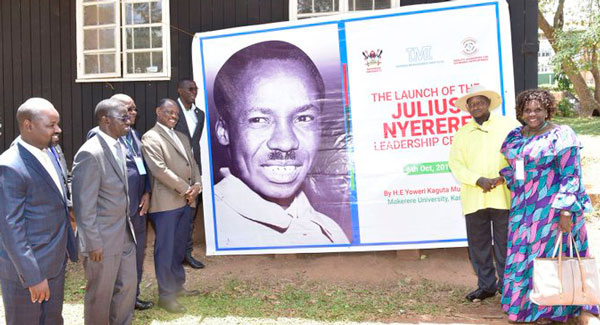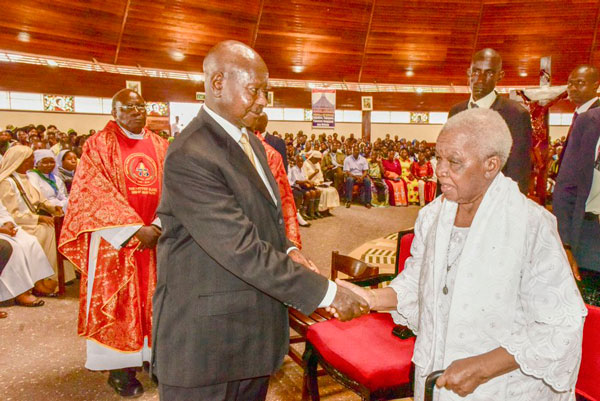
Historians and academics speak out on relationship between Museveni and his hero Nyerere on the 20th anniversary of the passing on of the former Tanzanian leader
Kampala, Uganda | IAN KATUSIIME | On October 14 Tanzania marked Nyerere Day; an occasion when Tanzanians from all walks of life honour the memory of ‘Baba wa Taifa’ (Father of the Nation). The 2019 Nyerere Day was a milestone as it was the 20th anniversary of the passing of Mwalimu Julius Kambarage Nyerere, first President of Tanzania and a unifying figure for his countrymen and women.
The 20th anniversary was a chance for some elites and historians to pause and reflect on the legacy of Nyerere, an independence hero and around whom Tanzanians have built a national identity espousing values of humility, incorruptibility and perseverance.
Nyerere is not just a revered figure in Tanzania but across many parts of Africa where he is often cited in the pantheon of liberation heroes like Kwame Nkrumah, Amilcar Cabrar and Samora Machel.
He is also intertwined with the history of Uganda’s political movements. Nyerere supported the struggle by Ugandan exiles to remove former dictator Idi Amin. He was a great friend of former President, Milton Obote, and an inspiration to the current one-President Yoweri Museveni.
Museveni has pushed for the canonisation (the act by which the Christian Church declares a dead person a saint) of Nyerere and his latest reference to Tanzania’s former president was on Oct.9, Independence Day in Uganda.
“Nyerere was determined to create a powerful centre of gravity in the form of the East African Federation,” Museveni said in his speech. Museveni speaks as if he deems Nyerere the greatest African to have ever lived.
The Independent picked the minds of some historians and politicians to gauge the relationship between Museveni and Nyerere; their similarities, differences and ideological convergence.
Abdullah Hasnuu Makame, a Tanzanian MP in the East African Legislative Assembly based in Arusha, shared what he thinks are the similarities between the two leaders. “President Museveni is a Pan-Africanist and is living the life Nyerere would have wanted him to live.”
Makame added: “Museveni wants a politically united and harmonised EAC that will lead to the integration of Africa which Nyerere also wanted.”

Makame said Nyerere’s desire to see a union between Tanganyika and Zanzibar at the time of their independence, is evidence of the former leader’s love for integrating Africa. Makame implicitly pointed out the differences between Museveni and Nyerere when he spoke more about the latter’s political legacy.
“Nyerere left us a democracy with a succession, every president serves two terms and goes,” he said. When Nyerere retired in 1985, he was succeeded by Ali Hassan Mwinyi. In came Benjamin Mkapa, Jakaya Kikwete and currently John Magufuli who have all have served for two terms.
National identity
Makame told The Independent about the strong national identity which Nyerere created. “There are 120 dialects in Tanzania and all of them are unified under the language of Kiswahili whether it is Chagga, Hehe, Sukuma, Kiswahili unites us and it is thanks to Nyerere.”
He said, “He eliminated tribalistic views and ideologies.” Similarly, it can be argued that Museveni has professed a disdain for tribalistic tendencies, pushing for ideology as a tool for transformation. Museveni speaks about ideology of interests in Uganda, and in other African countries.
Nansozi Muwanga, a lecturer of political science at Makerere University and the Acting chair of the board of the Julius Nyerere Leadership Centre at the same university says the two leaders’ similarities can be seen for the national policies they have championed. One for Ujamaa, the socialist economic development policy Nyerere devised and Museveni for his economic transformation agenda.
 The Independent Uganda: You get the Truth we Pay the Price
The Independent Uganda: You get the Truth we Pay the Price




I really dont see any ideological similarities between Nyerere and my M7.The only time there seems to have been a convergence was when M7 had just come to power(the years 1986 to 1990s till around 1994).The divergence begins to straighten out when M7 trades back on his earlier promises and positions,today the differences are in black and white,so clear.
Let’s accept it,Nyerere is with Mandela,Castrol and those guys that really worked to promote their countries,used the same products they built and moved on even when they couldn’t complete 80% of their objectives but realised that time and integrity mattered most.
Other than hailing from same region and working together to oust Idi Amin, and marginalizing opposition parties in their countries, I don’t see any similarities between the two.
Perhaps another near similarity is that Mwalimu Julius Nyerere influenced Museveni on no opposition politics which Museveni admired so much but perfected it.
Those who see similarities are swing illusions of M7 of yesterday. He has presided over corruption, nepotism, militarism, materialism, separatism _ each clan own district, deception, deterioration in morals etc. Uganda after him is a doomed enterprise. Nyerere left a promising enterprise
Mwalimu Nyerere was a true son and a for Africa. He embraced humility, modesity, incoraptivity and love for all mankind. He was indeed a firm leader. Any similarity with M7… Doubtful!!
You are right Mr . Nyerere was very unique. It is almost blasphemous to try to compare him with M7 or Magufuli. Mwalimu’s leadership skills and charisma were superb.